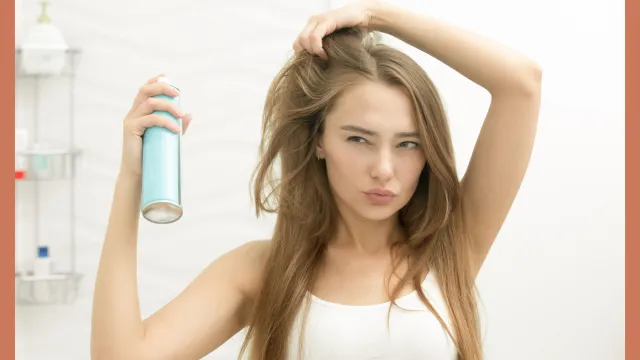


Dry shampoo has become a lifesaver for many people, offering a quick fix for oily hair when there’s no time for a full wash and blow-dry. However, as its popularity has grown, so too have concerns about its potential impact on hair health. One pressing question that has emerged is, “Does dry shampoo cause hair loss?” In this comprehensive article, we will delve into the world of dry shampoo, exploring its ingredients, usage, and any potential links to hair loss. By the end, you’ll have a clear understanding of whether dry shampoo is a friend or foe to your hair.

Before we dive into the hair loss aspect, let’s first understand what dry shampoo is and how it works. Dry shampoo is a hair product designed to absorb excess oil and freshen up the hair without using water. It typically comes in the form of a spray or powder and is applied directly to the scalp and roots. The main purpose of dry shampoo is to give your hair a cleaner appearance and extend the time between regular wet shampoos.
To determine whether dry shampoo can cause hair loss, it’s crucial to examine its ingredients. Dry shampoos usually contain a combination of the following:
These ingredients, like rice starch, talc, or silica, are responsible for soaking up excess oil from the scalp.
To leave your hair smelling fresh.
These are chemicals that help release the product from the canister.
Often included as a drying agent.
These help the product adhere to your hair and scalp.
Some dry shampoos may contain vitamins, minerals, or other hair-nourishing components.
The Connection Between Dry Shampoo and Hair Loss
Now, let’s address the primary concern: can dry shampoo cause hair loss? The short answer is that there isn’t a direct link between using dry shampoo and experiencing hair loss. However, there are some factors to consider:
Using dry shampoo excessively without regular cleansing can lead to product buildup on the scalp. This buildup may clog hair follicles, potentially contributing to hair thinning or a reduction in hair volume.
A healthy scalp is essential for hair growth. If dry shampoo is used excessively and not properly removed, it may lead to an unhealthy scalp environment, which could indirectly affect hair health.
Some individuals who use dry shampoo regularly may neglect proper hair care practices, such as brushing and conditioning, which can contribute to hair problems.
In rare cases, people may develop allergic reactions to specific ingredients in dry shampoo, leading to scalp irritation or hair loss. It’s essential to test any new hair products on a small area of skin before full application.
To enjoy the benefits of dry shampoo without risking hair loss or scalp issues, follow these guidelines:
Limit the use of dry shampoo to no more than a few times a week.
Apply the product evenly and from an appropriate distance to avoid excessive buildup.
Ensure you wash your hair with a regular shampoo and conditioner to remove any dry shampoo residue.
Pay attention to your scalp’s health and maintain a good hair care routine.
If you’re trying a new dry shampoo brand, do a patch test to check for any adverse reactions.
Different hair types react differently to dry shampoo. People with fine or thin hair may be more susceptible to issues related to product buildup and clogged follicles. It’s essential to tailor your dry shampoo usage to your specific hair type.
Excessive use of dry shampoo can make the hair feel heavy, dull, and lifeless. While it may not directly cause hair loss, it can lead to hair that appears less healthy and vibrant.
When applying dry shampoo, ensure that you spray or sprinkle it evenly onto your scalp. Proper distribution reduces the risk of concentrated buildup in one area.
After applying dry shampoo, gently massage your scalp to help distribute the product and stimulate blood flow. This can promote a healthier scalp environment.
Not all dry shampoos are created equal. Opt for high-quality products that are free from harsh chemicals and potential allergens. Reading product labels and reviews can help you make informed choices.
It’s essential to distinguish between hair loss and normal hair shedding. Hair shedding is a natural process, and we lose around 50-100 hairs a day. Dry shampoo should not significantly increase this rate. If you notice a sudden increase in hair loss or thinning, consult a healthcare professional to rule out underlying health issues.
When you do wash your hair, ensure you rinse it thoroughly to remove any residue from dry shampoo. Incomplete rinsing can lead to long-term buildup.
Consider using alternatives to dry shampoo, such as lightweight, sulfate-free shampoos specifically designed for frequent use, or natural remedies like cornstarch or arrowroot powder as an alternative to commercial dry shampoos.
If you have specific concerns about your hair and scalp, consult a professional hairstylist or dermatologist. They can provide personalized advice and recommend products that are suitable for your individual needs.
Remember that hair health is not solely dependent on one product. It’s a culmination of various factors, including diet, genetics, overall hair care routine, and lifestyle. A balanced diet rich in essential nutrients and good hair care practices are crucial for maintaining healthy hair.
The question, “Does dry shampoo cause hair loss?” doesn’t have a straightforward yes or no answer. When used in moderation and with proper care, dry shampoo is generally safe and unlikely to directly cause hair loss. However, excessive use and poor hair care practices can potentially lead to hair and scalp issues. Like many hair products, dry shampoo should be used wisely, keeping the overall health of your hair and scalp in mind. If you have concerns about hair loss, it’s best to consult with a healthcare professional or dermatologist for personalized guidance.